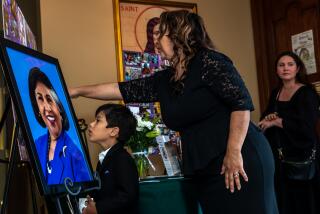TV Reviews : ‘Death of Cruzan’ Painfully Intimate
- Share via
Shorn of the usual distancing device of narration, Elizabeth Arledge’s painfully intimate “The Death of Nancy Cruzan,” the finale in her trilogy on the Cruzans, follows a family as they decide the fate of one of their own. (It airs on “Frontline” at 9 tonight on KCET Channel 28 and KPBS Channel 15; 8 p.m. on KVCR Channel 24.)
Surviving a near-fatal car accident, 25-year-old Nancy Cruzan’s “recovery” left her in a vegetative state. She was helpless and senseless, kept alive by intravenous feeding yet forever cut off from her loved ones.
Like Karen Ann Quinlan, she also became a national symbol of “the right to die,” but in a volatile political climate filled with the noise of the abortion debate and the clamor of “the right to life.” Given exclusive entry into the Cruzans’ lives during the nearly eight-year ordeal, Arledge’s camera records a brutalizing course of personal and social awakening, as a family matter becomes an issue before the Supreme Court.
This modest Missouri family--pained father Joe, stoic mother Joyce, straightforward sister Christy and her two bright young daughters, Miranda and Angie--finds itself caught in the pincers of medical technology able to keep patients alive as never before and of a conservative state (represented by Missouri Atty. Gen. William Webster) determined to prevent Nancy’s life-support system from being withdrawn.
The roller coaster of legal decisions from 1987 to 1990, highlighted by the Supreme Court’s 1990 reversal of a judge’s order permitting Nancy’s death, leaves Joe especially shellshocked: “These other two teams are playing, and they’re playing with my football. And there’s not a damn thing I can do about it--except watch.”
For anyone who has endured a loved one’s slow, painful decline, “The Death of Nancy Cruzan” hits so close to home that it can be nearly unwatchable at points--as when Joe reads a eulogy for Nancy during the last days when the family has at last been allowed to remove her feeding tube. This man’s private pain made so public parallels the entire Cruzan legal struggle; at the same time, his explosion of tears and emotion makes a mockery of the people outside the Mount Vernon, Mo., hospital who are protesting and claiming to know what’s best for Nancy.
Arledge’s perspective, though, is of overarching sympathy to every side of this 90-minute saga, including the nurses who obey but resent the final orders.
More to Read
The complete guide to home viewing
Get Screen Gab for everything about the TV shows and streaming movies everyone’s talking about.
You may occasionally receive promotional content from the Los Angeles Times.






